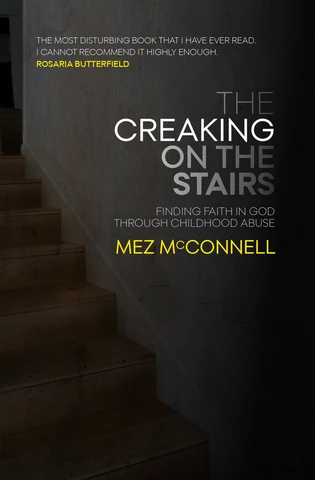
Mez McConnell
Reviewed by: Calvin Goligher
The Creaking on the Stairs: Finding Faith in God Through Childhood Abuse, by Mez McConnell. Christian Focus, 2019. Paperback, 240 pages, $10.31 (Amazon). Reviewed by OP pastor Calvin Goligher.
In the foreword, Rosaria Butterfield says that this is the most disturbing book she has ever read, and also that she cannot recommend it highly enough. After reading the book for myself, I can only agree with her on both points.
This really is a disturbing book. Drawing from memories of his own childhood, Mez McConnell gives us a hair-raising glimpse of the evil of abuse. At certain points, I noticed my face wincing, my heart pounding, and my gut twisting. I do not recommend that anyone read this book casually, or just before bed.
I do recommend that you read it, though, for several reasons. First, it powerfully communicates the basic message of the Bible. The author interweaves his own story with the biblical story that involves all of us. The book will leave you aching for the goodness of God’s creation, weeping at the tragedy of human sin, humbled by God’s majesty, silenced by his mercy, and rejoicing in hope for his redemption.
Second, this book is focused on Christ. One of the chapters is entitled “Consider Jesus” (from Hebrews 12:30; the whole book could fit under that title). Full divinity, true humanity, amazing compassion, innocent suffering, righteous judgment—this is the vast terrain in which the author considers the subject of abuse. In particular, the sufferings of Christ for us are described with a vividness both piercing and refreshing. It seems to me that this is one of the ways that God has brought good out of the terrible evil in the author’s life.
Third, this book shows the meaning of the gospel for both abuse survivors and their abusers, and it does so with amazing grace and gritty realism. There are no easy answers here, no band-aids, no hollow pieties. There is just the truth that we all (like abusers) deserve God’s judgment, and that we all (including abusers) can hope in God’s mercy. This point is fraught with difficulties, and the book navigates most of these well. At a couple points, though, it seems to take the line that “all sins are equal.” This sentiment contains enough truth to be attractive, but its logical conclusion is an unbiblical moral insanity. The Larger Catechism rightly counters it with an insistence that some sins “are more heinous in the sight of God than others” (Q. 150). In the context of this book’s consistently biblical and realistic perspective on sin, though, this is but a minor misstep in a field that is often filled with major blunders.
Church leaders should be sure to read the interviews at the back of the book, as well as the chapter “What do we mean by ‘childhood abuse’?” These real-life scenarios and clear definitions will help you to prevent abuse and also to prepare
March 30, 2025
On the Trail with a Missionary
March 23, 2025
Midnight Mercies: Walking with God Through Depression in Motherhood
March 16, 2025
March 09, 2025
Zwingli the Pastor: A Life in Conflict
March 02, 2025
February 23, 2025
African Heroes: Discovering Our Christian Heritage
February 16, 2025
© 2025 The Orthodox Presbyterian Church